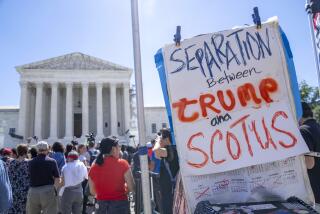Ethics: Trump already sees himself above law
Ethics is about flourishing, about developing both the personal characteristics and the social conditions that allow individuals to live full, satisfying lives together. When it functions at its best, ethics is largely invisible: individuals live good lives together, trusting one another and cooperating in ways that would be impossible without such internalized social norms. Ideally, individuals impose ethical restraints on themselves first and foremost, and only in exceptional cases are such restraints imposed from the outside.
Ethics quickly becomes noticeable when things go wrong.
Related: Ethics: Good of the U.S. must be president’s first priority
Scandals initially focus attention on the misdeed and the immediate perpetrators, and gradually the focus expands to examine the structures that permitted such abuses by covering them up or even by encouraging them. Rapes involving college football players, child sexual abuse by priests, cheating scandals at military academies, abuse of prisoners by police and prison authorities — the investigation of such actions typically leads to scrutinizing the wider conditions that made it possible. Along the way, investigations often result in the establishment of structures intended to prevent the recurrence of such abuses.
The ethical bar is higher in certain roles. Stricter ethical constraints are imposed on therapists, clergy, and others on whom individuals depend in moments of great vulnerability than those governing everyday relationships. Similarly, there is a higher bar for both police and military, both of which involve the possibility of great self-sacrifice for the common good. To assume such roles is to take on the distinctive responsibilities inherent in them. Sacrifice is woven into the fabric of these roles.
Ethics in the political realm imposes its own characteristic obligations. On the national level, some offices call for putting the good of the country above all else, or putting responsibility to the Constitution above all else. The ethics of national offices is shaped in part by this commitment to the country above self-interest.
The founders of the United States wisely foresaw that considerations of ethics can often be used as political weapons by the opposition, and recent history has borne out their fears. So-called ethics investigations have been used by both parties as a cover for witch hunts and political persecution. The temptation to politicize ethics investigations leaves the republic with a deep problem: how do we articulate and enforce ethical constraints in such a way as to respect legitimate differences of interpretation about the country’s best interests and simultaneously to prevent abuses of office that bolster personal gain or political advantage.
One institutional response to ethical lapses is the Office of Government Ethics, created in 1978 as part of the Ethics in Government Act in the wake of the Watergate scandal. The current director of the Office of Government Ethics, Walter M. Schaub, is an outspoken advocate of strong ethics compliance. Interestingly, the director’s term of office was set at five years, insuring that it would overlap presidential terms, and thus insulate the office from undue political pressure. The funding for the OGE, though, depends on Congress.
The presidency presents other unique challenges as well, especially regarding enforcement. How can ethical restrictions be enforced in the case of the most powerful person in our government (and perhaps the world), especially when that person is not known for welcoming criticism or disagreement? The power and grandeur of the office make it easy for presidents to gradually fall into a belief in presidential exceptionalism, the belief that the law does not apply to them. In different ways, both Richard Nixon and Bill Clinton at least gradually slid into this mindset. What is distinctive about President Trump is that he seems to be beginning his presidency at this point — and that certainly raises questions about what is to come.
Despite its limitations, ethics legislation has served in the last 40 years to establish certain minimal standards of openness and responsibility. The objective is clear: the chief executive should put the interests of the country first, above personal interests, and should be seen to do so as well. The president is exempt from direct conflict of interest constraints, but the Emoluments Clause of the Constitution prohibits any “Person holding any Office of Profit or Trust under [the United States]” from accepting “any present, Emolument, Office, or Title, of any kind whatever, from any King, Prince, or foreign State.” As Norman Eisen (former ethics czar to President Obama) and Richard Painter (chief ethics officer in George W. Bush’s administration) have pointed out, the rationale here is clear: The Founders wanted to avoid not just outright bribery but foreign influences that could sway the course of the republic.
The ultimate restraint on the president is impeachment and removal from office. We hope that presidents will be wise enough to restrain themselves, but there is a vast territory between self-restraint and impeachment and removal from office. That is the terrain occupied by the Office of Government Ethics, the Justice Department, legislators, the courts and the American people — all of whom, each in distinctive ways, provide a robust system of checks and balances against presidential excesses. But if ethics works best in a society in which individuals freely impose ethical obligations upon themselves, we will face unique challenges with a president whose understanding of social norms is not one we share.
Hinman is an emeritus professor of philosophy at the University of San Diego.
More to Read
A cure for the common opinion
Get thought-provoking perspectives with our weekly newsletter.
You may occasionally receive promotional content from the Los Angeles Times.










